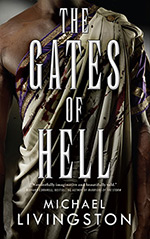
![]() Nymeria
Nymeria
4/14/2017
![]()
Through The Shards of Heaven, the first book in this series, I discovered a new sub-genre I enjoy quite a bit: historical fantasy, a way to blend entertaining reading with some real history--and to pique one's curiosity about learning more about the time period in which the story is set. For these reasons I was more than looking forward to continuing with Michael Livingston's series, and The Gates of Hell did not disappoint.
A few years have elapsed since the fall of Alexandria and the conquest of Egypt by Rome: after the deaths of Cleopatra and Mark Antony, their children are either dead, in hiding or, like Selene, prisoners of Octavian, now self-styled Caesar Augustus, emperor. Selene Cleopatra, has been taken into Octavian family's fold and married off to Juba II, son of the deceased king of Numidia, a double tie that should keep her under control. But Selene being Selene, she remains quite unbowed and although her marriage to Juba proves to be a happy one--where respect and friendship quickly turn into love--the need for vengeance is never far from her thoughts, doubly so because in this as well she finds a kindred spirit in her husband. With the help of the Shards they acquired--the Aegis of Zeus that Juba obtained in Alexandria, and the one hidden into a statue Selene stole from the temple of the Vestals--they work to master the power of the artifacts, with the goal of one day bring about the destruction of Rome.
Meanwhile, in Alexandria, Cesarion--son of Cleopatra and Julius Caesar, and Selene's half-brother--has gone deep underground to avoid capture and to help preserve the very powerful Shard hidden inside the Ark of the Covenant. When former legionnaire Vorenus visits the Head Librarian Didymus to inquire about the Ark's apparent loss of power, their conversation is overheard by disgruntled ex librarian Thrasyllus, who concocts a plan to put himself in Didymus' exalted position and gain the favor of the Roman occupants.
These are the main narrative threads at the heart of Gates of Hell, and they carry the story forward at a steady pace while expanding on the characters we met in Book 1: the preferred focus is on Selene and Juba, of course, and their increasing mastery of the Shards in their possession. There is an intriguing form of character osmosis--for want of a better word--between the two of them: Juba has become more reflexive, more inclined to think his way through and to consider every possible facet of a problem, while Selene has lost some of her merry-go-lucky youthful attitude (which is understandable, considering the heart-rending losses she endured) and she is the one who seems to be goading her husband toward their shared objective.
What's truly fascinating is the change in Octavian: I remarked on his cold cruelty in my review of Book 1, and how different he looked there in respect of the image that has come to us through time. I wondered if, in his case, the author was stressing the concept about history being written--and therefore shaped--by the victors. That's why I was surprised to see a softer side of the newly crowned emperor, that of a man who cares about the people he calls family and is very aware of the sacrifices he might call them to accept in the name of the grand dream he nurtures, that of a huge, peaceful empire. This change, one that comes along in small, organic increments until it blossoms into an amazingly selfless act, was not only a surprise for me as a reader but also for the character of Juba, who starts to question his and Selene's goal of vengeance and to lean toward a different path:
Was the Peace of Rome a truly horrible dream? Or was it perhaps something real, something tangible that was worth setting aside their need to avenge the fallen members of their families?
Some harrowing circumstances cause both Juba and Selene to review their stance and to accept a more peaceful path for their future, a fresh start that will allow them to forget the pain and loss in their past. But if Octavian has mellowed out in this second volume of the series, another historical figure--that of Tiberius--has taken the role of the antagonist here, and it will be the long reach of his actions that will determine the developments of the last part of the book, where the meaning of the title becomes horribly clear. As Selene and Juba battle with their inner demons (and not only those), Caesarion and his steadfast allies Vorenus and Pullo face a different kind of danger that will climax in a bloody battle fraught with heartbreaking losses.
The Gates of Hell proved to be a swift, sometimes breathless read, and it certainly paves the way for some huge developments: there were some... hiccups along the way, like the author's need to involve his characters in long philosophical discussions that were certainly interesting but that somehow broke the rhythm of the story; or the often-repeated information about the Shards, that at times sounds just a little pedantic. But apart from these very small blemishes, I enjoyed the book very much and I'm now waiting for the next installment with great expectation.
http://spaceandsorcery.wordpress.com